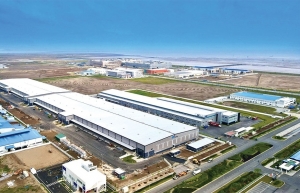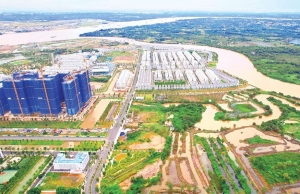The advantages and challenges of joint real estate investment in Vietnam
In Vietnam, the joint property investment model has been adopted by several companies in recent years. The recent launch of a new joint real estate investment company is great news for the market. Especially, in a time of constrained capital flow due to credit control from banks.
 |
| Trang Bui-Country head for Vietnam Cushman & Wakefield |
The latest is from Vingroup, who has just announced the establishment of VMI Real Estate Investment and Management Joint Stock Company for the purpose of investing in a certain amount of Vinhomes real estate, then divided into 50 parts so that investors without a large amount of capital can participate.
The buyer of each of these pieces will receive certifications of their asset and earn profit depending on the change in value. As announced, VMI commits to a minimum annual profit to ensure that investors still have a fixed income in case the market’s condition is not favourable. An online real estate information platform will be created to assist investors in finding investment information, exchanging, and finding other investors, with relevant consulting information and guidelines.
The model allows investors with smaller capital to join the market without the need to leverage risky financial instruments. In these types of funds, people contribute money to buy and have representatives to manage, use, and be responsible for selling and paying profits after deducting their own remuneration.
While this model is relatively new in Vietnam, it is not a stranger to the global financial market. One example is the Real Estate Investment Trust Fund (REIT) model.
A REIT is a company, trust, or association that invests directly in real estate through property or mortgages. They trade on a stock exchange and are bought and sold like stocks. REITs pay dividends as part of their structure.
In Vietnam, the first and only REITs is TCREIT, announced in 2021 by Techcom Capital. TCREIT focuses mainly on cash-flow-generating properties such as office buildings, retail shopping malls, hotels, and resorts. REIT fund certificates are still not a popular investment product because the legal frame for this model is not complete and stabilised asset classes are not big enough.
REITs in Vietnam are still in the early stage, however, with the fast-growing developments happening in all asset classes we are expecting to see more supply of stabilised income assets in the near future. As the market reaches this point, there will be more interest from institutional funds, banks, and investors to start creating REITs in Vietnam.
 |
| While joint real estate investment is relatively new in Vietnam, it is not a stranger to the global markets |
As Investors participating in any new form of capital contribution, they must have the knowledge to understand the value that this model brings and what factors could impact the outcome and their dividend collection. Some important factors to evaluate are profitability, profits, risks, and importantly, all legal aspects. The fund management companies, their reputation, and their experience are also extremely crucial factors to consider.
Looking at the nature of this form of investment, we can see that contributing money to these investment funds is no longer an investment in real estate, but more like an investment in a business. Thus, investors need to do in-depth research on that business and understand the capabilities of the leaders, coupled with a deep understanding of the foundations of the real estate market.
With clear payment, capital withdrawal, and transfer process – along with the economic growth momentum in favourable conditions – this model will surely attract a lot of attention.
With the rise of this model, the secondary real estate market is poised to become more vibrant, as more and more investors can participate in the market. New technology will also improve transparency and reduce barriers for investors from any location to participate.
 | Developers eager to cultivate funding in industrial real estate As industrial real estate is considered an attractive investment channel, several enterprises are beginning to focus more funding on the sector. |
 | Cushman & Wakefield sees potential for investment in Vietnam Gordon Marsden, regional director at APAC Capital Markets Cushman & Wakefield, has recently visited Vietnam. He spoke with VIR’s Bich Ngoc about the sentiment of international business and the latest trends in the Vietnamese property market. |
 | More clarity urged for draft guidelines of new Land Law Although the draft amended Land Law is deemed to meet the requirements for Vietnam’s economic development, it remains unclear whether it can solve practical problems in land acquisition, speculation, and valuation. |
What the stars mean:
★ Poor ★ ★ Promising ★★★ Good ★★★★ Very good ★★★★★ Exceptional
Related Contents
Latest News
More News
- Vietnam breaks into Top 10 countries and regions for LEED outside the US (February 05, 2026 | 17:56)
- Fairmont opens first Vietnam property in Hanoi (February 04, 2026 | 16:09)
- Real estate investment trusts pivotal for long-term success (February 02, 2026 | 11:09)
- Dong Nai experiences shifting expectations and new industrial cycle (January 28, 2026 | 09:00)
- An Phat 5 Industrial Park targets ESG-driven investors in Hai Phong (January 26, 2026 | 08:30)
- Decree opens incentives for green urban development (January 24, 2026 | 11:18)
- Public investment is reshaping real estate’s role in Vietnam (January 21, 2026 | 10:04)
- Ho Chi Minh City seeks investor to revive Binh Quoi–Thanh Da project (January 19, 2026 | 11:58)
- Sun Group launches construction of Rach Chiec sports complex (January 16, 2026 | 16:17)
- CEO Group breaks ground on first industrial park in Haiphong Free Trade Zone (January 15, 2026 | 15:47)

 Tag:
Tag:



















 Mobile Version
Mobile Version